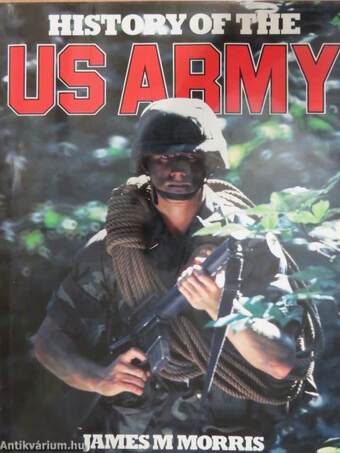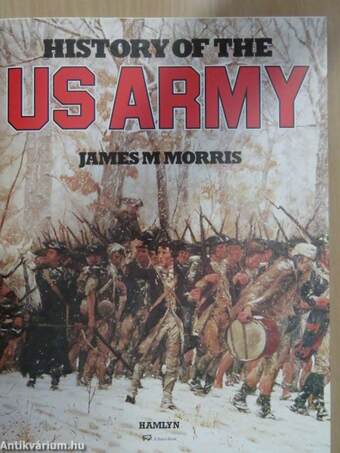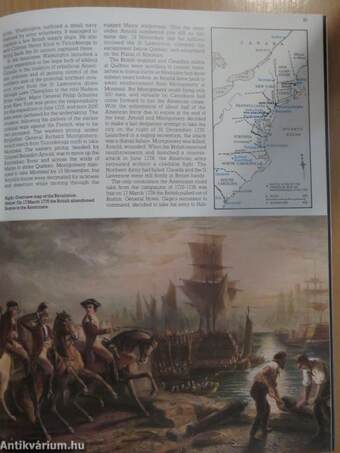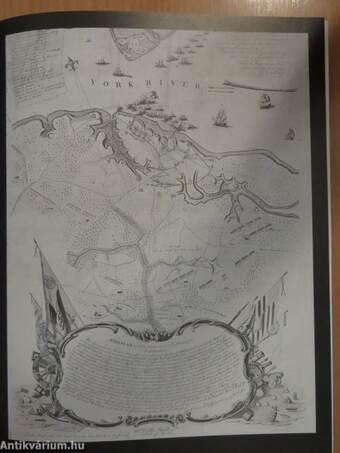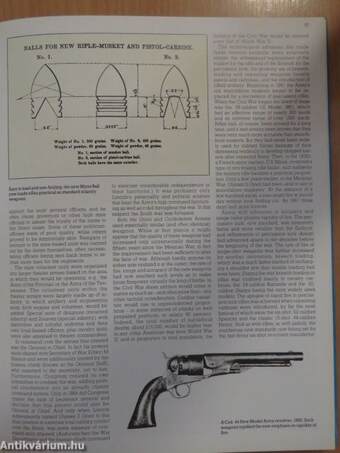1.067.290
kiadvánnyal nyújtjuk Magyarország legnagyobb antikvár könyv-kínálatát

VISSZA
A TETEJÉRE
JAVASLATOKÉszre-
vételek
History of the US Army
| Kiadó: | Hamlyn Publishing |
|---|---|
| Kiadás helye: | London |
| Kiadás éve: | |
| Kötés típusa: | Fűzött kemény papírkötés |
| Oldalszám: | 224 oldal |
| Sorozatcím: | Bison Book |
| Kötetszám: | |
| Nyelv: | Angol |
| Méret: | 31 cm x 25 cm |
| ISBN: | 0-600-50267-8 |
| Megjegyzés: | Színes és fekete-fehér fotókkal, reprodukciókkal, térképekkel. |
naponta értesítjük a beérkező friss
kiadványokról
naponta értesítjük a beérkező friss
kiadványokról
Fülszöveg
¦s mm
Tbday's formidable United States Arrny has a long and proud history. Indeed, its beginnings can be traced back to those hardy bands of colonial militiamen who fought to protect their lives, liberty and property from the hostile incursions of native Indians, foreign rivals and, fmally the troops of their own mother country Thus, when George Washington created the first true American army, the Continental Army, in 1775, America's tradition of Citizen soldiery was already a century and a half old.
In this authontative new History of The US Army James Morris telis the fascinating story of how this great American institution evolved from such humble beginnings to become the mightiest war machine in history. And along the way he reminds us of just how difficult it often was to achieve this impressive growth in the context of our essentially non-militaristic American society. Time after time the Army was allowed to wither away in peacetime, only to be called upon to go to war... Tovább
Fülszöveg
¦s mm
Tbday's formidable United States Arrny has a long and proud history. Indeed, its beginnings can be traced back to those hardy bands of colonial militiamen who fought to protect their lives, liberty and property from the hostile incursions of native Indians, foreign rivals and, fmally the troops of their own mother country Thus, when George Washington created the first true American army, the Continental Army, in 1775, America's tradition of Citizen soldiery was already a century and a half old.
In this authontative new History of The US Army James Morris telis the fascinating story of how this great American institution evolved from such humble beginnings to become the mightiest war machine in history. And along the way he reminds us of just how difficult it often was to achieve this impressive growth in the context of our essentially non-militaristic American society. Time after time the Army was allowed to wither away in peacetime, only to be called upon to go to war ill-equipped and under-prepared when somé new crisis burst upon the nation. And it was precisely at such times that the Army's true glory was best revealed, for no matter how unready, it never failed to rise to the challenges presented, never faüed to deliver victory when victory was what the nation asked of it.
Yet Professor Morris' book is more than the story of a great institution. It is alsó in large measure an account of the rise of modern warfare itself. The author makes clear, for example, how certain technical innovations of the 1840s and 1850s so drastically increased battlefield firepower that in the ensumg Civil War the inability of old tactics to match new capabilities produced the greatest bloodbath in American history, World War II not excepted.
And fmally perhaps essentially, this is a story of men - of great commanders, such as Washington, Morgan, Scott, Lee, Grant, Pershingand Patton, andofmillions of ordinary footsoldiers and airmen - whose achieve-ments have left our nation forever in their debt.
To illuminate Professor Morris' vivid, expert text History of The US Army offers hundreds of maps, photographs arid ülustrations, many in fali color. It is, in sum, a cornucopia both for the amateur of military history and for every reader concerned to know more about what is best and most inspiring in our national heritage. Vissza
Tartalom
CONTENTS
INTRODUCTION 6
1BIRTH OF THE AMERICAN ARMY: 1607-1781 8
2 YEARS OF TESTING: 1783-1860 36
3 THE CIVIL WAR: 1861-1865 - 60
4 SERVING A CHANGING NATION: 1865-1898 90
5 WARRIORS ON A WORLD STAGE: 1898-1919 102
6 WORLD WAR II IN EUROPE: 1939-1945 126
7 WORLD WAR IN THE PACIFIC: 1941-1945 170
8 COLD WAR AND GLOBAL COMMITMENT: 1945-PRESENT 196 INDEX 222 ACKNOWLEDGMENTS 224
Témakörök
- Idegennyelv > Idegennyelvű könyvek > Angol > Műszaki
- Idegennyelv > Idegennyelvű könyvek > Angol > Történelem > USA története
- Történelem > Idegennyelvű > Angol
- Történelem > Kontinensek szerint > Amerika, amerikai országok története > Észak-Amerika
- Történelem > Hadtörténet > Hadügy, hadviselés
- Történelem > Hadtörténet > Egyéb
- Műszaki > Idegennyelv > Angol
- Műszaki > Hadászat, hadtörténet
James M. Morris
James M. Morris műveinek az Antikvarium.hu-n kapható vagy előjegyezhető listáját itt tekintheti meg: James M. Morris könyvek, művekMegvásárolható példányok
Nincs megvásárolható példány
A könyv összes megrendelhető példánya elfogyott. Ha kívánja, előjegyezheti a könyvet, és amint a könyv egy újabb példánya elérhető lesz, értesítjük.



